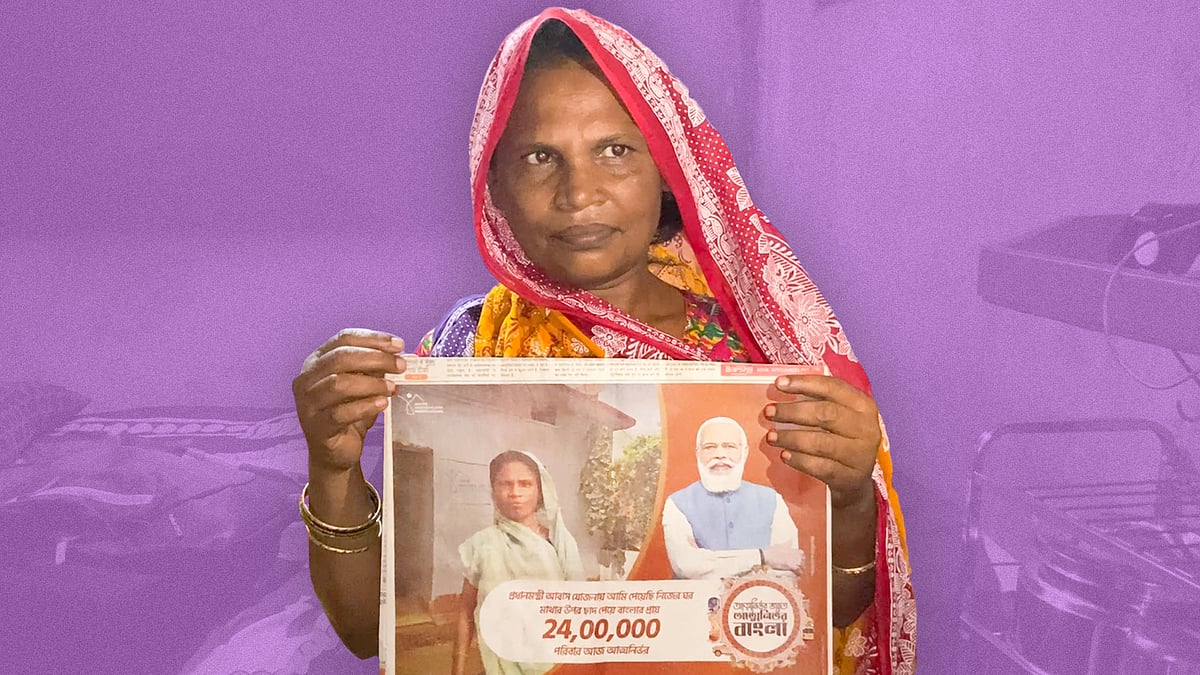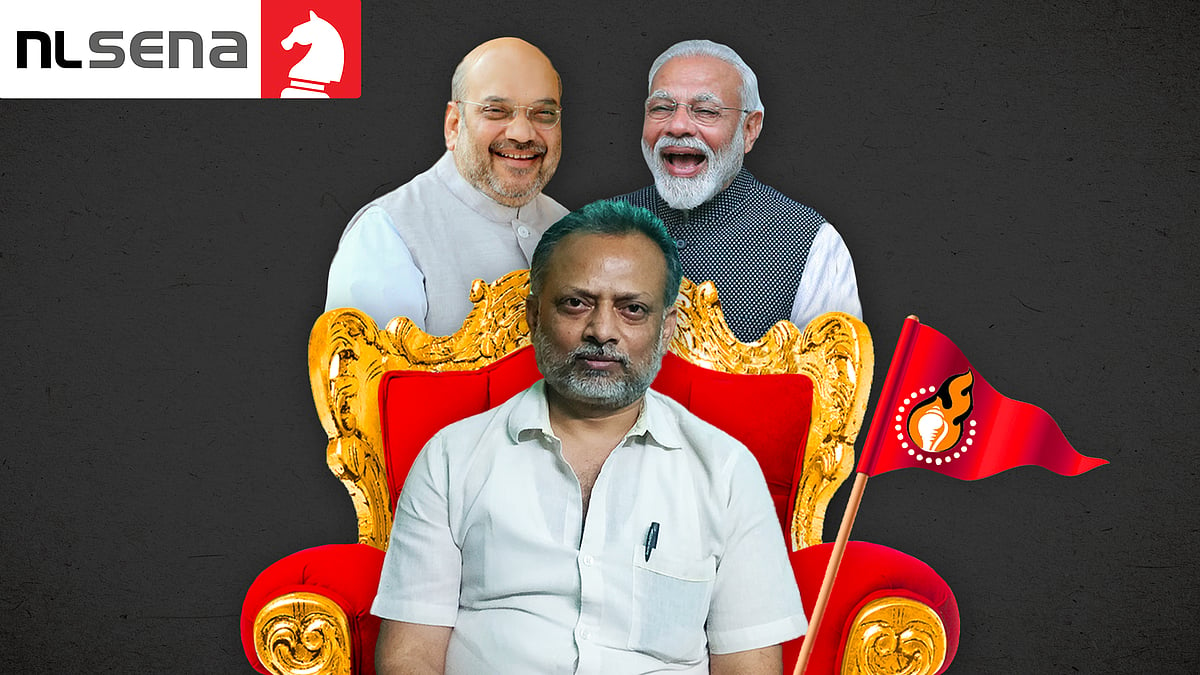Cut money and tolabaji: How deep is the anger against Trinamool?
Once collected as a ‘subscription fee’ by political agents to allow any work to be done, it’s pervasive and a big part of the BJP’s campaign rhetoric in Bengal.
In Bengal’s Bankura on March 21, prime minister Narendra Modi attacked chief minister Mamata Banerjee in his signature style, declaring, “Didi, the game of corruption cholbe na.” Cholbe na means not acceptable in Bengali.
Then, addressing the crowd, he turned it into a chant.
“Will you say it with me? Say cholbe na cholbe na!”
The crowd roared with approval.
“Didi, the game of corruption.”
“Cholbe na cholbe na,” echoed the crowd.
“The game of syndication.”
“Cholbe na cholbe na.”
“The game of cut money”
“Cholbe na cholbe na.”
Corruption, tolabaji or extortion, and cut money are major issues that the BJP is highlighting as Bengal heads to the polls. We have been trying to find out how pervasive these problems are, and how people in Bengal are receiving this rhetoric by the saffron party.
But first, allow me to explain how tolabaji and cut money works. Tolabaji is plain ol’ extortion. In Bengal it has been a tradition of sorts since the CPIM was in power. In the old Left Front regime, people would be required to pay a “subscription fee” to the party. A builder and promoter in Kolkata, who wished to stay anonymous, explained how it used to work.
“Whenever we had to do a project, CPIM workers would come and ask for a cut. They called it a subscription fee,” he claimed, “Once you paid the money, they would give you a receipt and nobody would bother you. If someone tried to take more money, you showed them the receipt and they would go away. It was a highly centralised system.”
But it changed after the Trinamool Congress came to power. When I asked the builder what happens now, he said there are multiple factions that want money for various things. “Now a Trinamool worker will come and say we have to buy sand from a particular vendor. If we don’t, they won’t let the work continue. Another will come and say we have to buy electrical fittings from their own designated vendor,” he explained. “It goes on and on. On top of it are the bribes you have to pay for all the permissions from the government.”
Another business owner we spoke with refused to give his name saying since it was election time he didn’t want to get caught in party politics. I asked him whether he could point me to one such person who asked for money but he was hesitant. “I don’t want to get into all this. Everyone knows this happens but nobody will be willing to talk to you,” he said.
He was right. On Park Street, a tea shop owner, a migrant from Prayagraj in Uttar Pradesh, told us his shop has been around for 40 years. Has any party demanded money to let him run his business? He claimed the street vendors’ union handles all that.
“We give money to the union people. They pay the police and other officials,” he said. When asked why he pays this money, he told us, “I have to run my business and I think of it as rent. It’s only fair, otherwise I wouldn’t be able to sit in this location where I get many customers.”
After speaking to more people, it was clear that such rent-seeking is just one part of the story as cut money appears in many forms. Most evidently when it comes to government schemes and benefits.
Dilip works as a driver in Kolkata. When he got his daughter married in 2018, a Trinamool worker came to tell him about the state’s Kanyashree scheme. “She told me if I applied for the scheme the government would give us Rs 25,000,” he said. “But she demanded that we give her Rs 5,000 once the money came.”
The Rupashree Prakalpa scheme was launched in 2018 to help financially stressed families to marry off their adult daughters. The aim was two-fold. One, to prevent child marriages since the grant is solely for women who are above 18. Two, to prevent families from entering a debt trap due to marriage expenses.
“I got the money in my bank after one year, in 2019. I had to withdraw and give Rs 5,000 to the TMC worker,” Dilip told me.
In 2019, Mamata publicly told her party’s workers to return the cut money they had extorted from people. She alleged that some TMC leaders were charging Rs 200 for releasing the sum of Rs 2,000 that the state government gave poor people to cremate family members. A similar modus operandi to that of Dilip’s case.
After Cyclone Amphan devastated Bengal in May 2020, there were massive protests against the government over cut money. Protestors alleged that the Trinamool took a cut out of the disaster relief package meant for the affected people and even from the food rations distributed during the lockdown. After receiving 2,100 such complaints against Trinamool workers, the Bengal government formed a committee to examine them and hailed it as an initiative towards ensuring “transparency”.
When we asked Dilip whether the cut money they took from him was returned, he laughed and said no. “How will they give it back? The woman who took the money has built a big two-storey house. She’ll have to sell her house to return all the money she took for years.”
To find out more about this, we visited Chetla in Kolkata. We picked this area after we found a document on the website of the ministry of housing and urban affairs listing the projects sanctioned under the PM Awas Yojana in Bengal.

The idea was to find out if the project had been completed and whether there had been instances of cut money or extortion being taken during its execution. After all, it was a perfect combination of construction work and government funding.
We found the housing unit. A board claimed that it had been inaugurated by the mayor of Kolkata, Firhad Hakim. The building is called Bangla’r Bari, or “Bengal’s House”.


We spoke to the residents there and they told us the building had been built by the state government. We specifically asked them if it was under the PM Awas Yojana, but they said no.
“Bobby da made sure we got this house. This whole area was a slum before this, but they demolished it and built this complex in a year,” said Mithu Mitra, who is now a home owner.
Firhad is affectionately referred to as Bobby by the people of the city.
We asked her if anybody had extorted money from her. “They didn’t take a single penny from us,” she said. “When they were building this house, they made sure we had a place to stay with all facilities. They didn’t charge us for that either.”

Firhad had announced Bangla’r Bari when he was the urban development minister in 2017. Reports on Bangla’r Bari indicate that families that get the houses are required to pay Rs 50,000 per flat. However, the people that we spoke with said they had got the houses for free.
A few meters away, we spoke to Sulekha Maiti, a housewife, who told us that they hadn’t witnessed any instance of extortion in their area. “We live in a place between dada and didi, nobody would dare extort from us,” she added. “We feel very safe.”
She also told us that her sister, Vandana Maiti, was married in 2019 and Firhad’s people helped them get Rs 25,000 under the Rupashree scheme. “We got the money 3-4 days after the marriage. They told us about the scheme and did all the paperwork as well,” Sulekha said. “The process was very smooth.”
When we mentioned Dilip’s experience, Mili Kanji, another housewife, said it may happen in other places, but not in hers. “I have heard of such things happening in my hometown of Amtala,” she said. “All party workers since CPIM’s time have been taking money from people there. But the case is different in Kolkata.”
Taking a cue from her, we will continue our investigation into this cut money phenomenon. As we head into rural Bengal this week, perhaps we will get a clearer picture of how the situation is and whether the BJP’s rhetoric against the Mamata government will find hold this election.
But one thing is clear: people are hesitant to speak out, about cut money specifically and the government generally. When we asked people on the street about their views about the government, they refused to speak on record. But when we spoke without the camera or off the record, they did speak up against the state government and the Trinamool Congress.
We will see if this trend continues in rural Bengal.
Some names have been changed to protect identities.
This is the first part of a series on corruption in Bengal and what the voters make of it.
***
This story is part of the NL Sena project which over 300 of our readers contributed to. It was made possible thanks to Vedant Kanade, Madhukar R, Shreyansh Jain, Navas, Ayan Dutta, Mathivanan, Padmani, Arjun Goutham, Sudarshana Mukhopadhyay, Ravi Pandey, Rajesh Shenoy, Sahit Koganti, Sarthak, Uma Rajagopalan, Somok Gupta Roy, Sam Sadguru, Tulasi Pemmasani, Praveen Surendra, Kamesh Goud, Ankur Mishra, Sharique Damda, Himanshu Singh, Akshaydeep Singh, Saurabh Bhatia, Chitrak Gupta, Mayukh Roy, Suhesh Lodh, Sumit Dhiman, Farzana Hasan, BK, Sandeep Sharma, Yuvraj Arora, Ranjith PS, Inderdeep Singh, Joseph M Raj, Gregory Cooper, Sayani Dasgupta, Soumit Ghosh, Daman, Raunak Dutta, Mhetre, Puneet Dravid, Md Rafat S Siddiqui, Shayan Sarkar, Aliasgar Khokhawala, Rinku Goel, Vijesh Chandera, Rohit Duggal, Qaim Alvi, Shubham Bangar, Sainath Naidu, Prabhat Lakra, Daksh, Bibhas Adhikari, Anima Dey, Sujith Nambudiri, Rahul Chauhan, Murali K, Aikya Chatterjee, Harshal Geet, Aditya Deuskar, Anindita Brahma, Abdeali Jivaji, Kamran Hambali, Pranav Prabhakaran, Ankur Mehrotra, Ston, Phani Sista, Kartik Rao, Sourav Banerjee, Ravinder Dasila, Rohit Jain, Gaurav Kumar, Anishkumar Madhavan, Abhijeet Kumar, Akash Chandra, Ridhima Walia, Priyanshu, Deepanker Mishra, Rishi R Mehta, Vaishali Miranda, Mithun Singh, Roger, Sandeep Roy, Bindhulakshmi, Jashan Ghuman, Subhadeep Banerjee, Suhas Gurav, Nahas, Apoorv, Reid Alexander Dsouza, Abhishek Chakraborty, Varun Arora, Oindrilla Mukherjee, Shageer, Arnab Chatterjee, Sahil Ali, Roushan Jha, Shamik Das, Srinivas Iyer, Simranjeet Singh Kahlon, Imran Shariff, Souvik Deb, Tamnjum, Rajeev Kumar, Nabil Shaikh, Sushmit Roy, and other NL Sena members.
Contribute now and help to keep news free and independent.
 'This is wrong': Meet the woman in Modi's housing ad
'This is wrong': Meet the woman in Modi's housing ad Strong base and Bengali Hindutva: In Howrah, far-right Hindu Samhati comes to BJP’s rescue
Strong base and Bengali Hindutva: In Howrah, far-right Hindu Samhati comes to BJP’s rescue